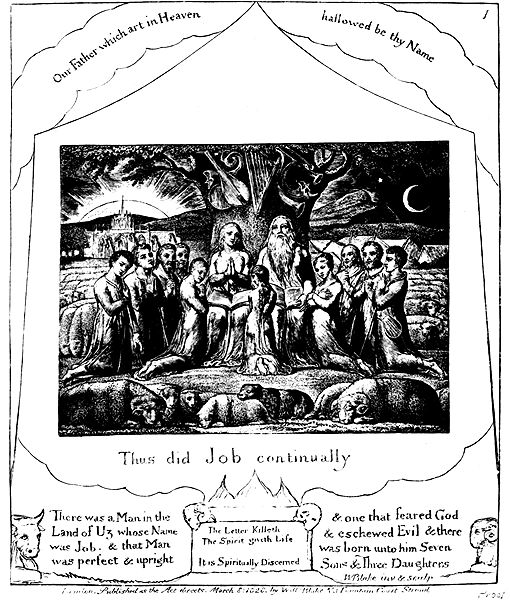To return to the post move back with
Picture 1 seems right out of the Bible: we see Job with his family (all musicians) gathered around while he and his wife read from the good book and he prays to them. In the top left the sun sets over the cathedral, a symbol of organized religion (of organzied society, government, commerce, and the whole bit). The sun is not to rise again until the end of this dark night.
Such was Job: "blameless and upright; he feared God and shunned evil."
Click on the picture, and then enlarge your font, and you can read the legend(s), of which there are many:
Above the picture you may find the beginning of the Lord's Prayer suggesting an "innocent trusting attitude toward God", an innocence about to be sacrificed.
Beneath the picture proper you may imagine an altar with four animals (perhaps an ox, two lambs, and a ram), where Job offered the sacrifice for possible sins of his children. (This O.T. idea has a parallel in the gospels, where God sacrificed his Son for our sins.)
Edinger p. 17: "Inscribed on the altar are the words, The Letter Killeth. The Spirit giveth Life, indicating that it is the word and Job's reliance on it which are to be sacrificed."
As a fairly young man Blake wrote The Four Zoas, a voluminous work in Nine Nights. Now at 65 he illustrated the Book of Job with a one composite Night. Both works tell the same story.
The text from Job 1:
" In the land of Uz there lived a man whose name was Job. This man was blameless and upright; he feared God and shunned evil. 2 He had seven sons and three daughters, 3 and he owned seven thousand sheep, three thousand camels, five 1 hundred yoke of oxen and five hundred donkeys, and had a large number of servants. He was the greatest man among all the people of the East."
4 His sons used to take turns holding feasts in their homes, and they would invite their three sisters to eat and drink with them. 5 When a period of feasting had run its course, Job would send and have them purified. Early in the morning he would sacrifice a burnt offering for each of them, thinking, "Perhaps my children have sinned and cursed God in their hearts." This was Job's regular custom."

No comments:
Post a Comment